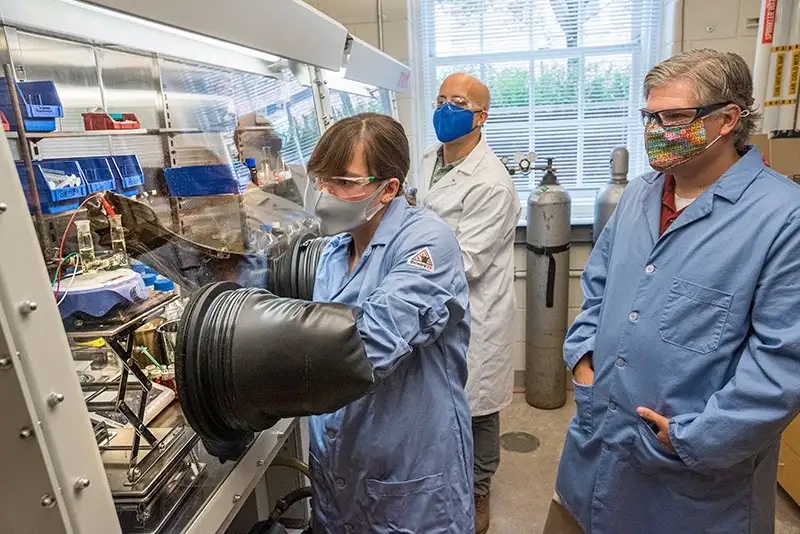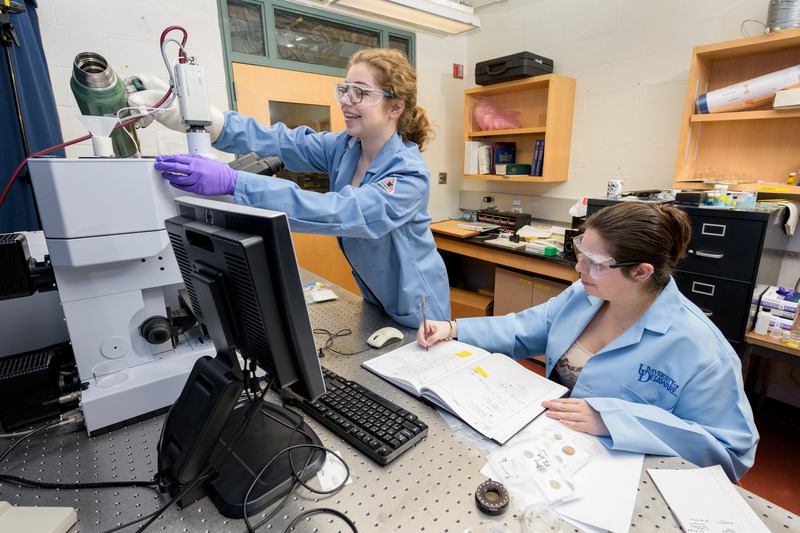
Graduate Programs

Welcome
The University of Delaware's graduate program in Chemistry and Biochemistry was one of the first advanced-degree programs established at the University, awarding its first Ph.D.s in 1948. Over the last 70+ years, the program has conferred nearly 1,000 doctoral degrees to students that have gone on to positions in industry, academia and government laboratories. Hallmarks of the program include a strong concentration in the broadly defined subjects of chemistry and biochemistry, cutting-edge research facilities, and excellent faculty mentorship that emphasizes the development and maturation of each individual student.
The Department of Chemistry and Biochemistry offers programs leading to the Ph.D., M.S., and M.A. degrees. Financial support is available for Ph.D. students in the form of teaching assistantships, research assistantships and fellowships. Such support provides a highly competitive stipend that is guaranteed for at least five years, allowing our students to comfortably focus on their research and education as they develop into independent scholars and proficient scientists. The thesis for the Ph.D. or M.S. degree may be completed in a number of traditional areas of concentration, with emphasis placed on a mix of interdisciplinary coursework and research experiences. In addition to stressing a multidisciplinary approach within chemistry and biochemistry, students are encouraged to explore coursework and research partnerships offered through other departments when they fit logically into the student's proposed dissertation area.
General Information Regarding the Graduate Application Process
General Information Regarding the Graduate Application Process
Our Department of Chemistry and Biochemistry offers M.A., MS and Ph.D. degree options. Students that apply to our program primarily pursue Ph.D. studies in either chemistry or biochemistry. This program is intended for full-time students desiring an advanced degree in chemical or biochemical research. Admission to the Ph.D. program usually includes full financial assistance in the form of teaching assistantships, research assistantships, and fellowships. Such support provides a highly competitive stipend that is guaranteed for at least five years, allowing students to comfortably focus on their research and education as they develop into independent scholars and proficient scientists. Note that it is not necessary to complete an M.A. or MS degree prior to enrolling in our Ph.D. program.
The M.A. (coursework-based) and M.S. (coursework- and research-based) programs in Chemistry or Biochemistry are suited for graduate students wanting to gain a deeper understanding of chemical principles at an advanced level. Full-time or part-time applicants may apply for admission.
Admission to the M.A. or MS program in Chemistry or Biochemistry does not include financial assistance from the Department. Both full-time and part-time applicants should ensure they have adequate resources to cover tuition and living expenses for a period of at least 2 years.
General requirements:
- Resume, Personal Statement, Transcripts, Letter of Recommendation
- Graduate Application Supplemental Document—Research Interest Area
- TOEFL or IELTS for International Applicants
If you have questions about these programs or if you would like to apply for other programs (for example, part-time study toward a Ph.D. degree), please contact Dana Wallace.
If you have questions during the application process many of your questions can be answered either on the Graduate and Professional Education website.
Evaluation Procedure
Once a prospective student's application materials have been received, our departmental admission committee will review your file. Evaluation of applications for admission in the fall semester will begin the preceding December and continue through March or until all positions are filled. When decisions on individual applications are reached, you will be notified through email. In the interim period, you may check on the status of your application through UD's online application system.
If you have problems with the online application system, related to its functionality, contact the office of Graduate and Professional Education gradadmissions@udel.edu.
All other questions may be directed to:
Lars Gundlach
Department of Chemistry and Biochemistry
University of Delaware
Newark, DE 19716
Telephone: 302-831-2331
Email: larsg@udel.edu
Chemistry-Biology Interface (CBI) Program
The Delaware Chemistry-Biology Interface Program is part of the CBI training grant program funded by the National Institutes of General Medical Sciences. The program provides additional opportunities for doctoral students to gain exposure to scientific concepts, methods from both chemical and biological sciences.

Electrically Driven Chemistry
Metal organic frameworks (MOFs) are a promising class of materials that have many applications as catalysts, sensors and for gas storage. Widely studied over the past two decades, MOFs are typically produced using chemical processes that require high heat and high pressure.
Now, University of Delaware chemists Joel Rosenthal and Eric Bloch report that it is possible to produce iron-based MOF materials directly using renewable electricity at room temperature. The UD-developed method is 96% efficient in using electricity to form the MOF materials quickly, reliably and inexpensively.
The University of Delaware holistically supports its graduate students, beginning with their health and wellbeing. Benefits include a subsidized health plan and physical and behavioral health services. UD fosters a culture of academic excellence, with committed faculty and staff and access to state-of-the-art research facilities and technology. UD prioritizes professional development with job training, internships and industry partnerships. Graduates further enhance their professional growth and visibility with opportunities to work on interdisciplinary research teams, present their work at conferences and publish in academic journals. Visit the links below to learn how UD is supporting society’s future leaders, scholars, and innovators.



